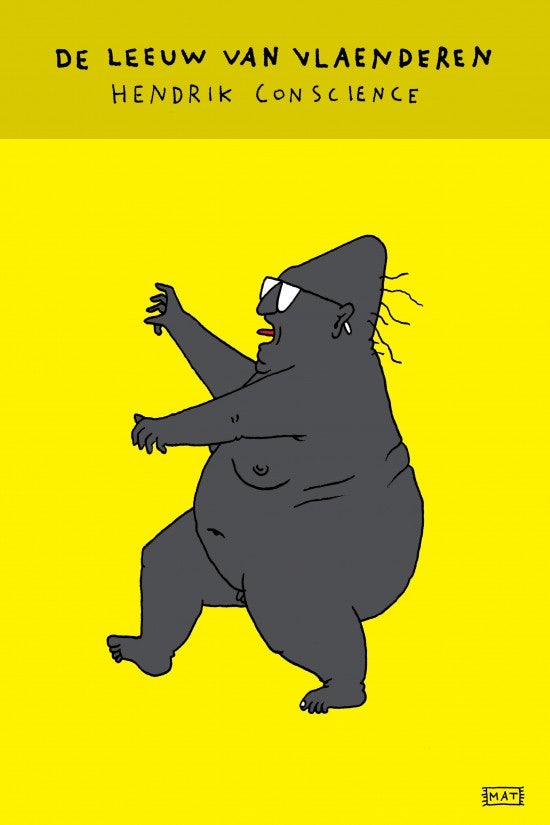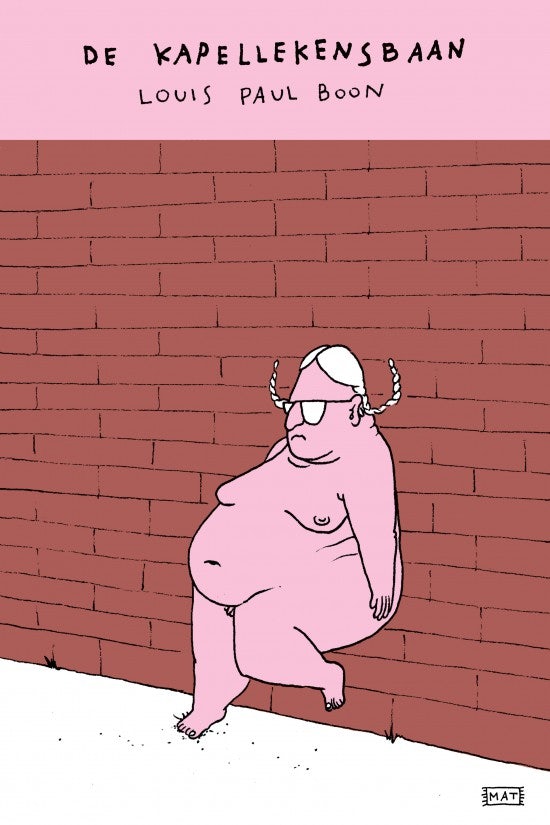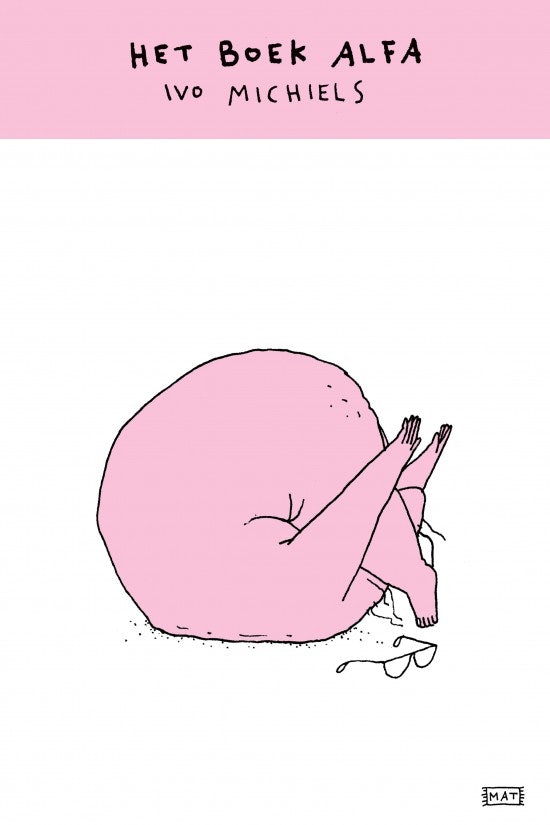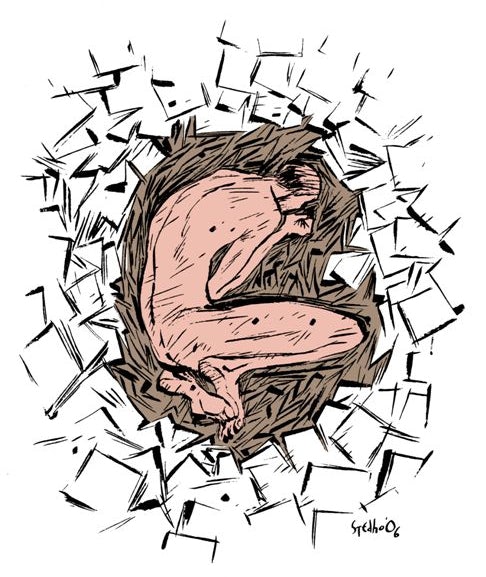A typically Flemish novel
In his novel, The Convert (2016), Stefan Hertmans tells the story, based on facts, of an 11th-century woman from northern France. Against her parents’ wishes, Hamoutal marries a Jew from the south of France and runs away with him to the region where he was born. After a few happy years, they receive a visit from the Crusaders, who are on their way to the Promised Land. These men murder Hamoutal’s husband and abduct her children, so she sets off to search for them in Egypt. Hertmans, who cemented his reputation with his novel War and Turpentine, which won praise worldwide, gracing the ‘best books of the year’ pages of many an English-language newspaper in 2016, has written a typically Flemish novel with ‘The Convert’.
‘But why?’ you might ask. ‘The book’s not even set in Flanders.’ But it doesn’t have to be. The small size and position of Flanders within Europe mean that we have always been reliant on other countries. Flemish literature has never been self-centred. Who am I? How do I relate to others? And how does this change the world and my view of it? These are questions that Flemish writers have posed in their books time and time again. It is perhaps unnecessary to point out the relevance of Hertmans’ novel at a time when increasing numbers of people are fleeing from violence and the friction between cultures is causing so many sparks to fly.
The very beginning

And it has always been thus. As we can see if we go back to the earliest days of the Flemish novel, when it was effectively invented by Hendrik Conscience, with his romantic epic The Lion of Flanders (1838). A love story coupled with the tale of the Flemings who defeated the French in 1302 at the Battle of the Golden Spurs was a perfect fit for European thinking at the time, which focused on independence and liberation from the oppressor’s yoke. Conscience placed Flanders on the European map.
It was only with the naturalism of Cyriel Buysse that books were written in Flanders that could effortlessly withstand the test of time. His novels about the harsh life of peasants could be seen as the Flemish counterparts of Emile Zola’s ‘Germinal’, while his comedy of manners The Aunts (1925) has thematic similarities with ‘Thérèse Raquin’.
The big three: Elsschot, Boon and Claus
In 1933, Willem Elsschot, an advertising man from Antwerp, wrote the very amusing Cheese, a fine parody of the thinking and behaviour of the urban bourgeois man. ‘Cheese’, and also, for instance, Elsschot’s Soft Soap/The Leg, set in the same world, are examples of what humorous novels should be: books that show the absurdity of life and of human activity and that make the reader reflect on these subjects. The great success of new translations of ‘Cheese’ in the 2000s, including into English and German, demonstrate the sparkling timelessness of this classic.

Social engagement has always been part of the world of Flemish novels. It is only when such engagement combines with literary adventure that we can truly speak of world-class literature. Louis Paul Boon, journalist, collector of erotica, and the man who showed that it is possible to be a James Joyce in Dutch, is the finest and foremost example of this approach. In his 1953 masterpiece Chapel Road he has a contemporary author discuss with friends a book that he is writing, which is set in the nineteenth century. It is about a girl who wants to escape from a grey industrial town ‘where it is always raining, even when the sun is shining’. On another level, a number of observers comment on events. This book was a huge success and – thanks to its postmodern quirks – also a timeless one. It made Boon a serious candidate for the Nobel Prize.
The biggest name in Flemish literature is perhaps that of Hugo Claus: poet, writer of plays, novelist, painter and the man who filmed Conscience’s ‘The Lion of Flanders’. Claus’s magnum opus is without a doubt The Sorrow of Belgium (1983), which has been translated into 23 languages so far. This is a coming-of-age novel about a boy who grows up in the Second World War and tries to stand firm amidst resistance and collaboration, ultimately choosing for the anarchism that lies hidden deep within him. No other author had written about the war with such sharpness and intelligence, with such nuance and empathy.
Emancipation
After the Second World War, which turned all accepted standards and values upside down, including in literature, Flanders experienced an emancipation of the novel. The pre-war leading role played by Felix Timmermans and Stijn Streuvels, who had lifted regionalism to a higher level, was taken on by Gerard Walschap, who breathed new life into the novel with his vitalism and his battle against the institution of the church. Authors began to pay attention to movements in other countries. Johan Daisne and Hubert Lampo, for example, came up with their own variation on magic realism, and Jos Vandeloo and Ward Ruyslinck became hugely popular in Flanders with their novels inspired by the social engagement of the 1960s.

In the 1960s and 70s, self-reflection also enjoyed a heyday in the Flemish novel. Ivo Michiels firmly chose the path of experimentation with his novel Book Alpha (1979). This preference for experimental writing was continued by Daniël Robberechts, who made writing itself a subject of exploration in his diaries and novels. We can also see this trend in the writing of Pol Hoste and, to a certain extent, in the novels of Koen Peeters, who writes curiously intriguing novels with his idiosyncratic mixture of fiction and nonfiction.
‘The Belgians are better’
Alongside the monuments of Claus and Michiels, other leading Flemish authors in the 1980s and early 1990s included Monika van Paemel, Walter van den Broeck, Eric De Kuyper and Leo Pleysier. They were alarmed by a number of young newcomers who sent a fresh wind blowing through Flemish literature: Kristien Hemmerechts, Tom Lanoye and Herman Brusselmans, who, still today, are prominent authors in the Low Countries, whose success heralded the arrival of a whole new generation.
‘The Belgians are better,’ was the title of a notorious article written by the critic Arjen Fortuin and published in the Dutch quality daily NRC Handelsblad in 2006. The article argued that a whole generation of talented and promising Flemish authors had emerged at the beginning of the millennium, who were ‘better’ than their Dutch peers. Although that comparison can, of course, be questioned, this article certainly marked the beginning of a period when Flemish literature again began to be taken seriously, gaining in self-confidence.
Fortuin claimed that, following the debut of the award-winning Erwin Mortier, a whole generation of interesting Flemish authors had arisen. He saw two characteristics linking these authors: a great feeling for language and style and a singular, uncompromising way of writing. A number of writers from this generation have become the most prominent modern Flemish authors: Dimitri Verhulst, Annelies Verbeke, Peter Terrin, Yves Petry, Jeroen Theunissen and Saskia de Coster.
Violence and society

War and violence, and how to deal with them, are themes that are still relevant in Flemish literature today. In recent years, Erwin Mortier, Stefan Hertmans, Stefan Brijs and Kris Van Steenberge have all written monumental and internationally successful novels about the First World War, and Paul Verhaeghen and Jeroen Olyslaegers have done the same with the Second World War.
One contemporary classic is Peter Verhelst’s Tonguecat (1999), a novel that follows both fairy-tale and mythical storylines against the backdrop of a society in decline and tending towards anarchy. Some people now see this book as a foreshadowing of the Arab Spring, which has prompted a number of new translations.
Social involvement accompanied by a fascination with human beings breaking boundaries can be found in the work of Elvis Peeters, who is in fact a team of two, a couple who write books together. In each new book they go in search of the place where current events and imagination meet, with reality at times surpassing fantasy. In 2005, for example, they wrote The Uncountables, a hallucinatory novel in which Europe is inundated with millions of refugees and it all goes wrong. They scored another bullseye with Us (2009, filmed in 2018), in which Peeters presents eight adolescents who go further and further in their perversion, holding up a mirror to society. Elvis Peeters writes harsh, but very relevant novels.
Expansion
We can see in Flanders, too, that not only society but also literature is becoming more diverse. New people and genres are claiming their places on the literary playing field. Jef Geeraerts, for example, was a trendsetter in Flemish crime literature. Some important contemporary names in this genre are Pieter Aspe, Luc Deflo, Bavo Dhooge, Toni Coppers and Rudy Soetewey. In recent years, work by interesting Flemish crime authors, such as Hilde Vandermeeren, Bob Van Laerhoven and Bram Dehouck, has also been translated.
Another expansion within Flemish literature has been the success of a number of young female authors who focus on the personal, on happiness and drama close to home. Griet Op de Beeck is a fine example: her books have touched a huge number of readers in Flanders and the Netherlands and have also been translated.
Lize Spit’s debut, The Melting (2016), is darker and more sardonic in nature, but has been just as much of a success. It is about a young woman who takes revenge on the village where she grew up and does so in a particularly original and cynical way. Spit perfectly succeeds in capturing the claustrophobic atmosphere of a small Flemish village a few decades ago.
Another new voice belongs to Fikry El Azzouzi, playwright and author of three novels about the character Ayoub, who is trying to find his way during different phases of his life. Like Rachida Lamrabet, El Azzouzi is one of the Flemish authors with an immigrant background who, with their acclaimed writing, have expanded the voice of Flemish literature to incorporate today’s diverse reality.
At the beginning of this essay, we wrote, ‘Who am I? How do I relate to others? And how does this change the world and my view of it? These are questions that Flemish writers have posed in their books time and time again.’ This is still the case today, but the diversity of literary forms expressing these questions has increased. Flemish literature is still not self-centred, but looks out into the world with self-confidence.
